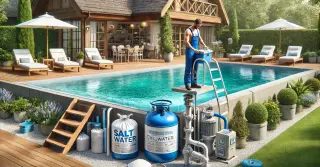Advanced treatments for maintaining pools are crucial to guarantee the hygiene, safety, and durability of your pool. Routine care is crucial, but sometimes, your swimming pool demands specialized care to address specific issues and maintain optimal conditions.
Shock treatment is a vital part of pool maintenance that requires adding a large amount of chlorine to the swimming pool. This process eliminates bacteria, algae, and impurities that standard chlorination can't address. Shocking your pool every seven days or following heavy use maintains the cleanliness and safety of the water.
Algaecide ApplicationAlgae growth is a frequent problem in swimming pools, especially in the summer. Algaecide application helps to prevent and control algae growth. This special treatment includes applying algaecide to the pool water, which targets and kills algae spores. Regular algaecide use keeps your pool clear and avoids green water.
Metal RemovalIf your pool water has a high metal content such as iron, copper, or manganese, it can lead to staining on the pool surfaces. Using metal sequestrants attach to these metals and prevent them from causing stains. Applying a metal sequestrant to your pool is particularly important if you use well water. Routine application helps maintain the aesthetic appeal of your swimming pool and avoids expensive repairs.
Enzyme ApplicationUsing enzymes are beneficial for breaking down organic material such as body oils, lotions, and other debris that build up in the water. These contaminants can cloud the water and lower the effectiveness of sanitizers. Applying enzymes dissolve these organic materials, keeping the water pristine and enhancing the performance of your pool's filter.
Hardness ManagementKeeping the right calcium hardness levels in your pool is crucial to prevent scale formation and corrosion. High calcium levels result in scaling, while insufficient calcium can cause corrosion. Applying calcium control treatments ensures balanced the hardness of your pool water, protecting your pool surfaces and equipment.
Phosphate RemovalPhosphate levels in the pool can lead to algae growth, as they act as a food source for algae. Phosphate control methods include using a chemical that sequesters phosphates and eliminates them from the pool. This method decreases the chance of algae growth and maintains clear water.
The Necessity of Safe and Effective TreatmentsWhen picking treatments for pool care, it is crucial to use safe and effective products. Choosing high-quality, verified, and reliable products guarantees the best outcomes and safeguards the health of pool users. Steering clear of low-quality or untested products avoids potential health hazards and keeps your pool lasting longer.
In conclusion, advanced treatments for pools are crucial to sustain a safe, clean, and efficient pool. Regular use of these treatments addresses specific issues and enhances the overall condition of your pool. Choosing high-quality, safe treatments ensures the best results and extends the life of your pool.


